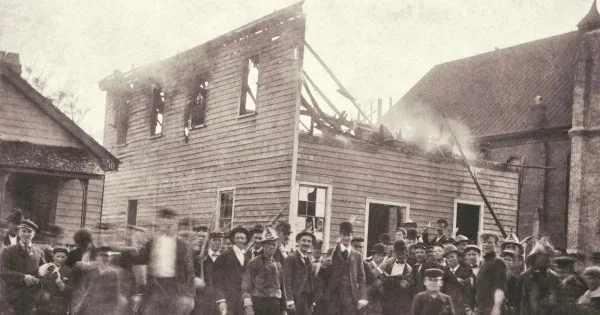It’s all the time attention-grabbing to me how the HBO collection Watchmen helped deliver the Tulsa bloodbath into the popular culture consciousness in a giant approach. May your movie be the step in that course of for the Wilmington bloodbath?
Richen: We haven’t been requested that query! You realize, I feel all of these items construct on one another. Watchmen was an HBO collection with well-known individuals and all of that, so it’s a little bit little bit of a special beast. However there was an impartial movie about Wilmington that got here out a number of years in the past, which is after I first heard about it. Then the David Zucchino e-book received the Pultizer Prize in 2021, and now there’s this movie. Let’s hope Wilmington continues to get into the general public consciousness in the identical approach Tulsa has. These occasions of racial terror have to be part of our historical past.
Lichtenstein: I do need to add that Yoruba is a very good actor, so if a collection does occur, I feel she must be in it. [Laughs]
We’ve seen a concerted try in conservative circles to dismiss the form of historic reckoning that your movie offers with as being “too woke.” The Wilmington residents that you simply interview within the movie don’t appear really feel that approach, although. What’s the disconnect between that bigger messaging versus what you noticed on the bottom?
Lichtenstein: One of many issues that occurs again and again in America’s historical past is that America tries to jot down a story that places itself able of being that shining beacon on the hill. The need to take a look at ourselves actually will get pushed down in favor of that exceptionalism narrative. Wilmington is a good instance of a narrative that was intentionally buried for therefore lengthy. Once we talked to white descendants, a lot of them instructed us that they by no means actually knew about what occurred or that they have been instructed one thing completely different than what the reality was. We’ll by no means be the nation we attempt to be if we don’t have some reckoning with our previous and be accountable to it.
Richen: What I’ve present in making these sorts of movies is that persons are hungry to be awake. And that’s what offers me hope, fairly frankly. So every time I hear that phrase “woke,” I all the time really feel that we have to counter that with, “You need to be asleep?”
How did you divide up the interviews for the movie?
Lichtenstein: One of many benefits of being a Black and white directing crew is that to the diploma that interviewees would possibly really feel extra comfy [with one of us], we’re capable of accommodate them. However Yoruba and I even have a seamless division of labor: some issues tended to fall into my purview, and a few fell into hers. I feel she interviewed extra students than I did, and I interviewed extra descendants than she did. And a few of that additionally simply got here all the way down to our schedule and the truth that we trusted one another.

